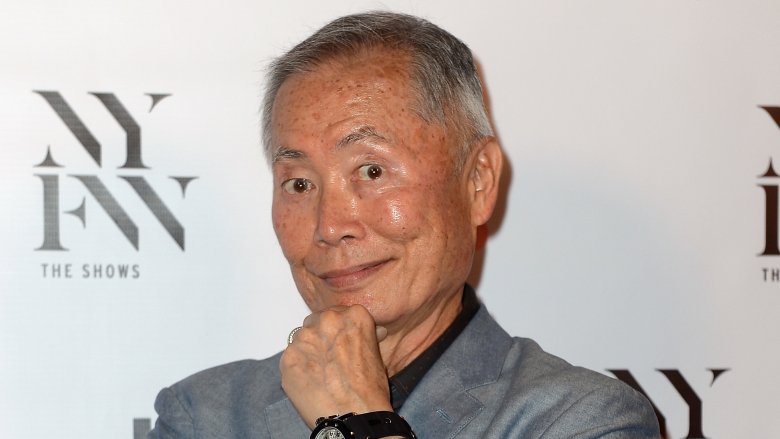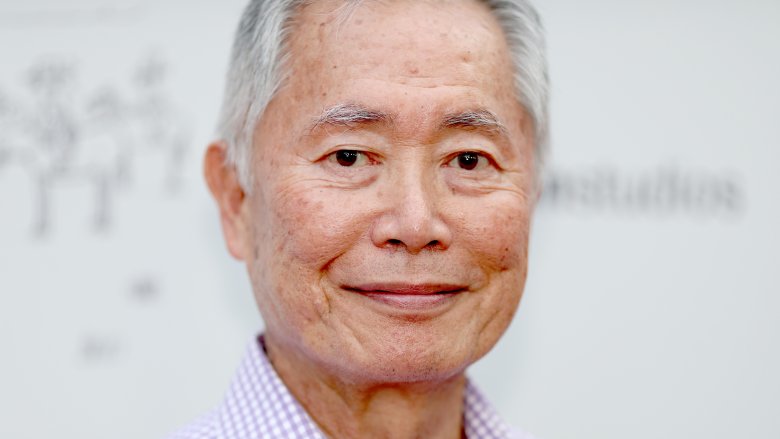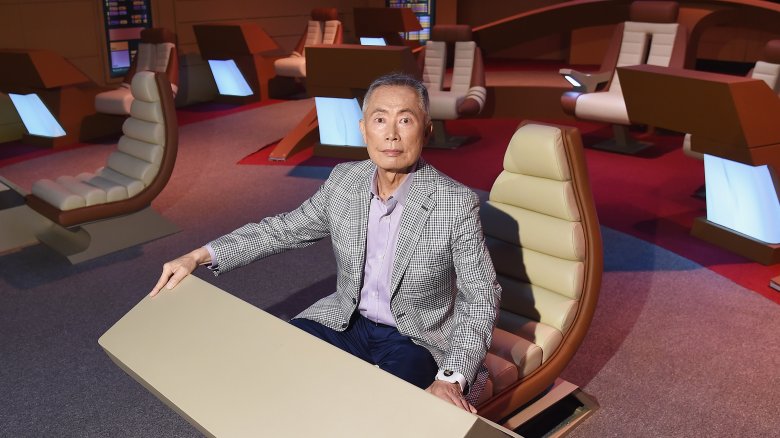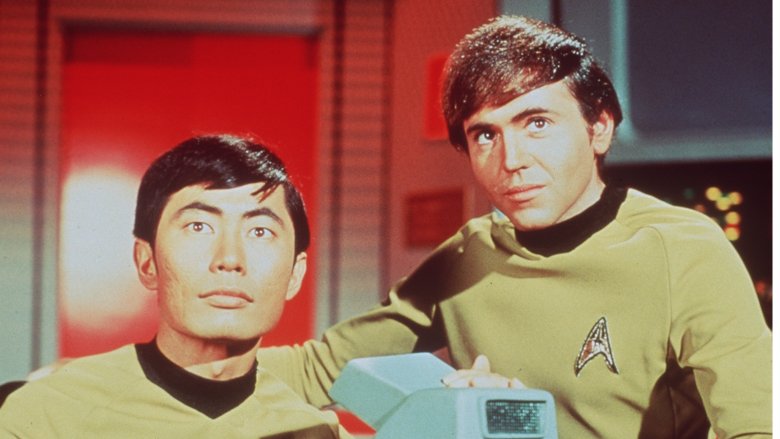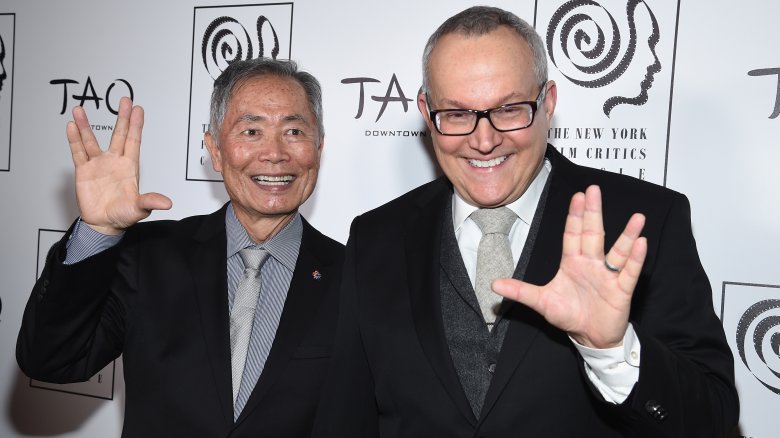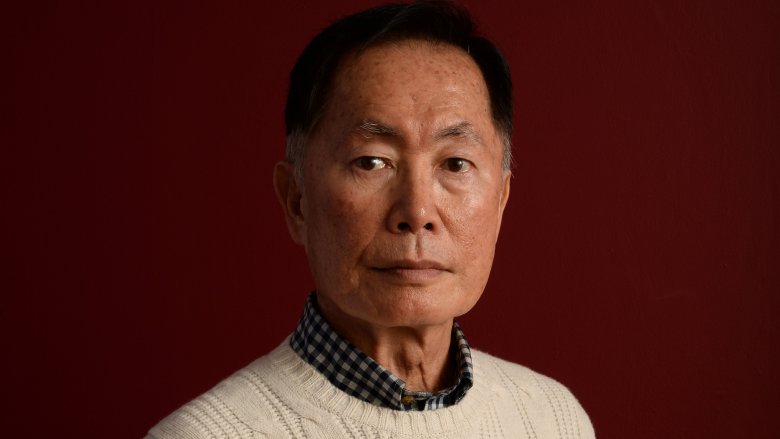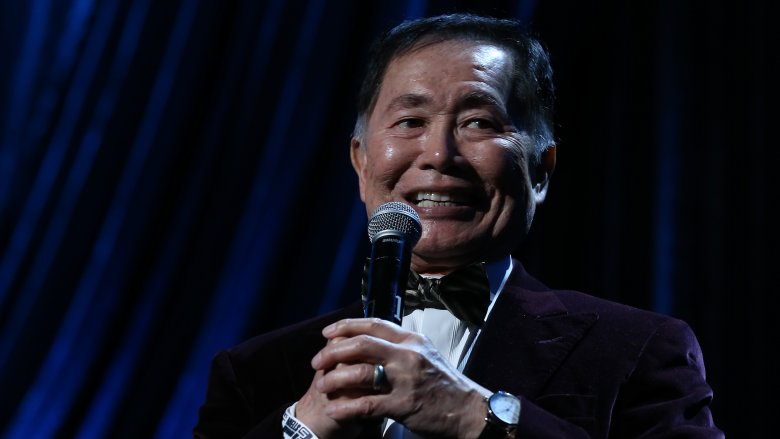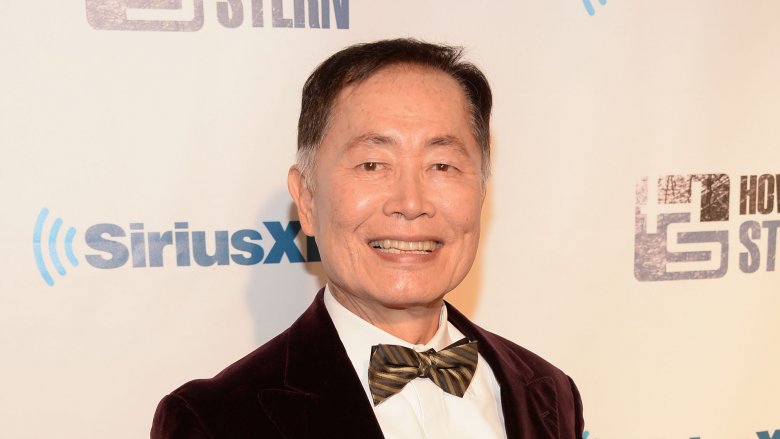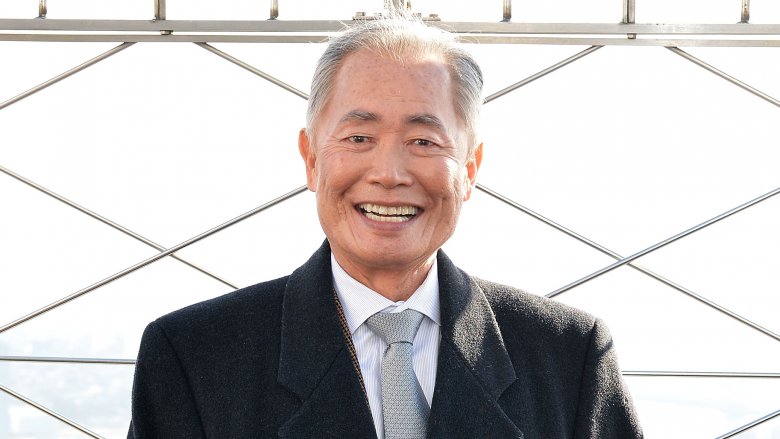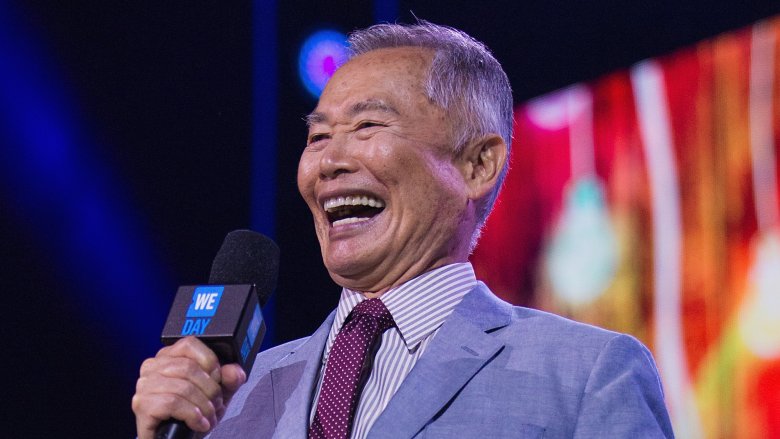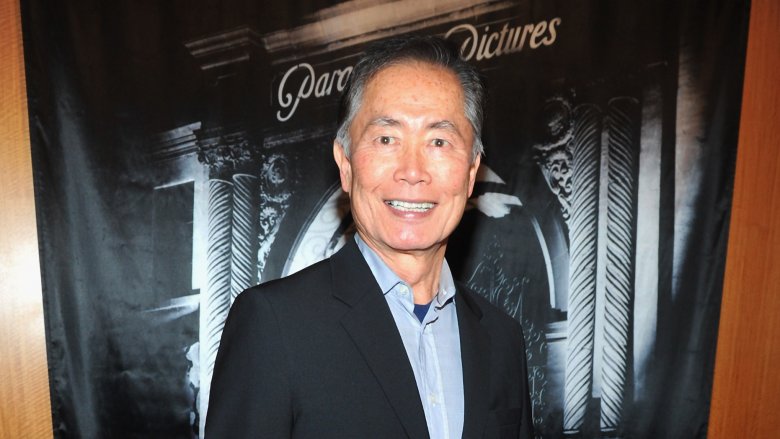The Untold Truth Of George Takei
For most people, George Takei is the guy who played Hikaru Sulu on Star Trek, but, to others, he's the man that said some highly controversial things as a guest on The Howard Stern Show. Takei wears many masks. Even for those fans that have followed his career closely, his chameleon-like quality in show business makes him difficult to pin down. All at once, he is a pop-culture icon, an author, a Broadway star, an activist, and a social media influencer.
Takei has shown that he's not afraid to speak his mind and, for some, including the Trump family, he can be quite the nuisance. Still, as popular and familiar as Takei appears on the surface, he remains a mystery for many. For that reason, we boldly go beyond Takei's Star Trek fame and explore his rich past filled with trailblazing, controversy, and everything in between. Here is the untold truth of George Takei.
A 'horrific, traumatic' childhood
Takei has spoken at length about his childhood spent in a Japanese internment camp, and he even starred in a Broadway musical, Allegiance, that was based on his experiences. When he was 5 years old, Takei and his family were stripped of their possessions and forced to move from their home in Los Angeles to an internment camp in the swamps of Arkansas. For three years, home was a barracks enclosed by barbed wire and dotted by armed sentry towers, but they adjusted to life inside the fences.
Leaving the camp at age 8 brought new challenges for Takei and his family. "We lost everything. We were given a one-way ticket to wherever in the United States we wanted to go to, plus $20," he said (via i09). "Many people were very embittered about their West Coast experience, and they chose to go to the Midwest, places like Chicago or Milwaukee, or further east to New Jersey, New York, Boston. My parents decided to go back to Los Angeles."
With no work and no housing available to them, Takei's family settled in the decrepit Skid Row neighborhood. For Takei, being forced to leave home in the first place was bad, but "coming home was a horrific, traumatic experience."
He blazed a trail for Asian actors and characters
Star Trek fans are well aware of just how groundbreaking the show was, but even for die-hard fans, George Takei's groundbreaking role in the entertainment industry is often overshadowed by that of his co-stars. For example, many are aware that the kiss between Captain Kirk (William Shatner) and Uhura (Nichelle Nichols) was the first interracial kiss on television, but fewer fans recognize just how much Takei blazed a trail for Asian actors.
"There were very few opportunities, and the few opportunities that there were, were unattractive characters — the villain, the servant, or the buffoon," said Takei. "It was very difficult to get roles where we were human beings." Well, that's what Sulu was on Star Trek – a human being.
With Takei performing this role so well and for so long on such a popular and iconic show, his influence stretched far and wide. "So many people came up and told that, for the first time, they had someone that they could relate to and be proud of when they turn on Star Trek," Takei said. "They saw an Asian character who was not a stereotype, who was, in many ways a hero, who was part of the leadership team of the ship. He didn't talk with an accent. He was a great guy."
Those infamous Star Trek feuds
William Shatner (Capt. James T. Kirk) reportedly feuded with several of his Star Trek co-stars, including Leonard Nimoy (Spock), the late James Doohan (Capt. Montgomery "Scotty" Scott), and George Takei. According to Takei's autobiography, To the Stars (via the New York Post), Shatner allegedly pretended he didn't even know Takei on set and supposedly tried to change the script for Star Trek V to diminish Takei's role.
Shatner said those claims are bogus: "There must be something else inside George that is festering, and it makes him so unhappy that he takes it out on me, in effect a total stranger," he said (via the New York Post). "Why would he go out of his way to denigrate me? It's sad, I feel nothing but pity for him."
Takei also feuded with Walter Koenig (Chekov) over changes to the script. "Walter Koenig was brought in to essentially say the words that were written for me," Takei claimed in an interview with Mother Jones. "I had already memorized them because I was so excited. When I came back I hated Walter sight unseen," he said. "We worked it out. As a matter of fact, we had a shortage of dressing rooms so they asked me to share my dressing room with Walter — a person who had stolen my part! But he turned out to be a really good friend." Koenig even served as Takei's best man at his wedding.
Playing the game with his sexuality
Although Takei reportedly "came out" in 2005, he sees the process a little differently. According to an interview with Frontiers, Takei's announcement was "not really coming out, which suggests opening a door and stepping through. It's more like a long, long walk through what began as a narrow corridor that starts to widen."
During a talk at South by Southwest Interactive, Takei discussed that journey. "By the time I was nine or 10, I was making discoveries about my sexual orientation," he said, but he worried that being openly gay would "block" his acting dreams. "You live under the fear of being outed all the time," he told The Guardian. "I played the game. I took a female friend to premieres and parties, and then I'd take her home and go to a gay bar. It was a double life." Takei became more outspoken during the AIDS epidemic in the '80s, telling the South by Southwest audience that he began "giving money to all these causes." Around that time, Takei also joined a gay Los Angeles running club called Frontrunners, where he met his future husband, Brad Altman.
Patriotism through protest
Takei has shown great interest in politics and activism throughout much of his career. He's dedicated substantial time and energy to educating the public on America's past, specifically in regards to the internment of Japanese-Americans. He fought for gay rights, galvanized by then-California Gov. Arnold Schwarzenegger's veto of a marriage-equality bill.
When professional football players made waves for kneeling during the national anthem, Takei made his feelings known by tweeting: "Protest is patriotic." Takei has participated in some of the most famous protests in U.S. history. He marched with Dr. Martin Luther King in the 1960s, and he shook hands with King after performing in a musical about civil rights at UCLA. In the documentary To Be Takei, the actor says (via Wired) he was also "in the peace movement with Jane Fonda and Donald Sutherland" during the war in Vietnam. Takei insists that his advocacy is always rooted in patriotism. "I am dedicated to making my country an even better America," he said during a TED Talk, "to making our government an even truer democracy."
That one time in summer camp
It's not unusual for guests on The Howard Stern Show to tell eyebrow-raising stories, but during a 2010 segment of the radio program, George Takei courted controversy when he recalled his earliest sexual encounter, which took place at a summer camp when he was 13 or 14 years old.
In the story, one that Takei repeated during a Reddit AMA and in the To Be Takei documentary, he says he was seduced by a camp counselor that he describes as an "experienced" male about "18 or 19" years old. As the encounter turned sexual, Takei describes it as "frightening, shocking and wonderful." Though Takei insisted the experience was not molestation, he was criticized for romanticizing a potentially dangerous situation. Takei's personal anecdote may not have been harmful to him, but that same situation for another person could easily be construed as assault.
Takei as the 'naughty gay grandpa'
The summer camp piece wasn't the only segment on The Howard Stern show that landed Takei in hot water. In 2017, he addressed the flood of sexual assault allegations against movie mogul Harvey Weinstein in a very uncomfortable way. Takei joked about his own use of persuasive tactics on "people that are kind of skittish or maybe afraid." Takei admitted that he had groped and/or grabbed others, but he attempted to distance himself from Weinstein by stating that "it didn't involve power over the other."
Those comments did not go unnoticed. Shortly after the segment aired, Takei issued an apology (sort of) on his Facebook page: "I agree that the joke was distasteful, and I'm very sorry [Stern] and I made fun out of a serious matter." He also claimed that when he appears on The Howard Stern Show, he plays the part of the "naughty gay grandpa," thus playing up some of the more salacious aspects of his life.
He was accused of sexual misconduct
When sexual misconduct allegations surfaced against George Takei in 2017, fans were shocked and many were angered as the actor joined a growing list of alleged wrongdoers in Hollywood. Takei has vehemently denied claims that he groped a model named Scott Brunton at the actor's Los Angeles condo in 1981. Takei said he was "shocked and bewildered" by the accusations made by a man he doesn't remember.
The Observer interviewed Brunton and reported that the accuser's story did present some troubling discrepancies. According to reporter Shane Snow, "just because [Brunton] is inconsistent in his accounts does not mean we should jump to the conclusion that none of this happened at all. Victims often change details, out of panic or memory fallibility." Snow said he also doesn't "fault Takei for feeling unfairly judged, or, at 80 years old, for not remembering Brunton."
Where does that leave Takei and his reputation? To date, no one else has come forward reporting predatory behavior from Takei, and according to Snow, Brunton said he "just wanted to spur an old friend to reach out and to say sorry for an unwanted situation." Should Takei's "name go on lists alongside rapists and pedophiles? ... Should the story of [his] human rights work be deleted from books? Should the accusation appear in [his] obituary?" Snow asks, noting that those details are on you to decide.
Takei vs. the Trumps
George Takei has butted heads with Donald Trump for years. He's slammed Trump's policies and mocked him for the way he answers questions in interviews. Takei even developed an app called Trumpy Cat designed to ridicule the president. "This is, without a doubt, one of the most absurd and tragic moments in U.S. history. We should feel upset about some of the things that are happening, but we created this app so we can laugh about some of the more ridiculous stuff," the actor said.
But the feud between Takei and the Trump family has not been purely one-sided. After Takei poked fun at the president's son, Donald Trump Jr., over his alleged involvement with Russia, Don Jr. fired back, taking aim at Takei's aforementioned sexual misconduct allegation via an awkward joke on social media. "Wrong again Georgie..." Don Jr. tweeted. "I guess you have a bit more free time to read #fakenews now that it's a bit tougher to ply kids with alcohol to assault them??? You know with all the added scrutiny."
Yes, there was work beyond Star Trek
George Takei's Star Trek past attracts plenty of attention because of the show's legacy and because his career was associated with the show for so long, but Star Trek wasn't Takei's first showbiz gig. In fact, he started acting more than a decade before that breakout role.
One of Takei's early jobs was dubbing English voices into the American edits of the Japanese films Godzilla Raids Again and Rodan. "There was one word that we had tremendous difficulty getting the meaning of and finding an English word that fit the lip movement," Takei recalled. "The Japanese word was 'bakayaro,' which means 'stupid fool.' And finally, the director came up with a word, and we tried it and it fit. The English word was: banana oil."
Takei appeared to catch his big break in 1964 when he landed an episode of The Twilight Zone, but that episode, "The Encounter," gain notoriety for the wrong reasons and only aired once. According to Takei, "because it dealt with this young man's father, who was a Japanese-American who signaled Japanese planes that bombed Pearl Harbor, it roused a little controversy, particularly with Japanese-American and Asian-American civil liberties groups."

